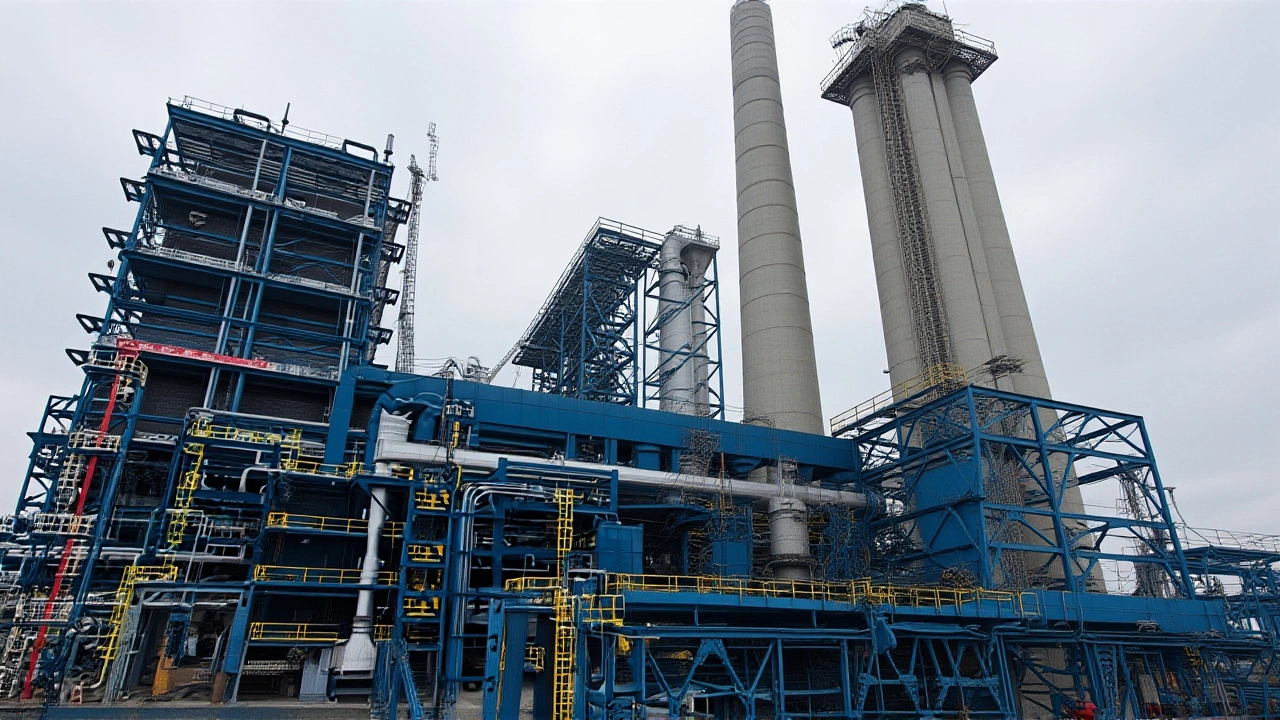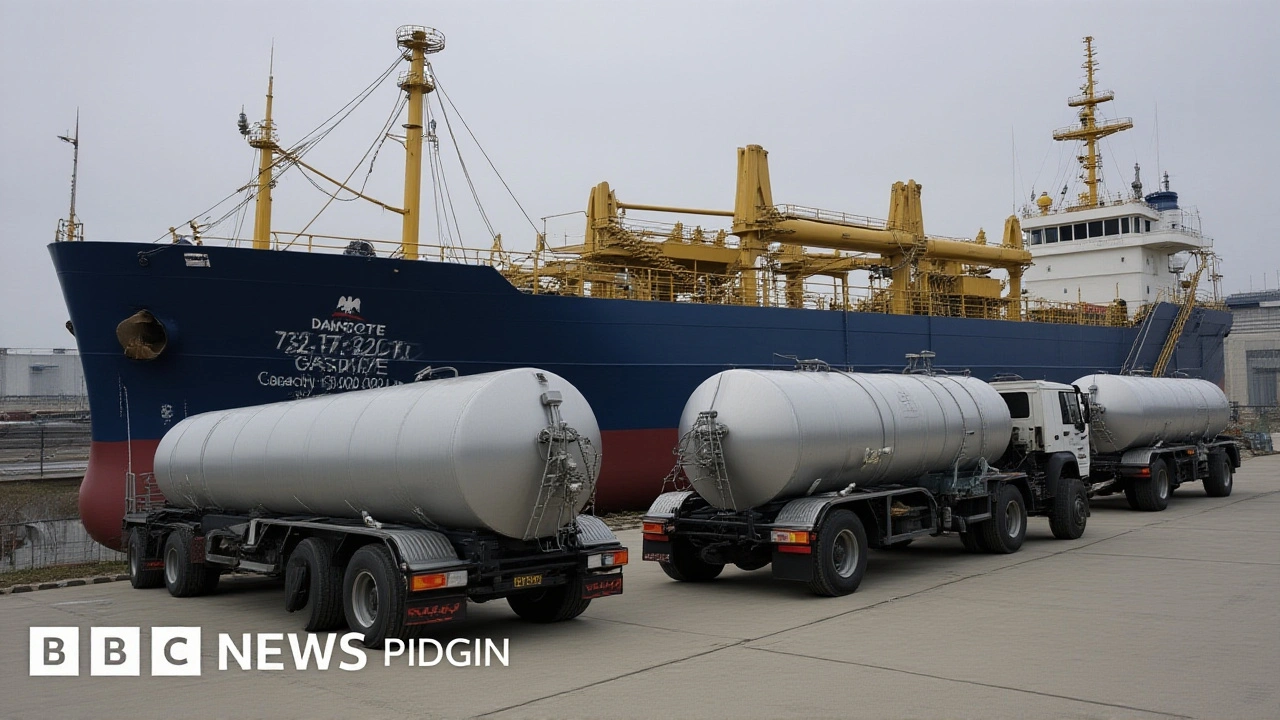On September 27, 2025, the Petroleum and Natural Gas Senior Staff Association of Nigeria (PENGASSAN) ordered its members to cut gas and crude deliveries to the Dangote Petroleum Refinery, igniting a nationwide strike that began at 06:00 GMT on September 28.
Background: The rise of local refining
When Devakumar Edwin, vice‑president of Dangote Group announced in 2024 that the $20 billion refinery would start commercial operations, many saw it as a game‑changer for Nigeria’s chronic fuel imports. With a capacity of 650,000 barrels per day (bpd), the plant can produce roughly 44 million litres of gasoline daily—enough to cover a third of national demand.
Historically, PENGASSAN (the "steel backbone" of the labour movement) exercised de‑facto control over fuel logistics by coordinating supply from the state‑run Nigeria National Petroleum Corporation (NNPC) to downstream terminals. The new refinery threatened that monopoly, prompting a tense undercurrent that would later erupt.
Strike initiation and immediate actions
At 06:00 on September 28, 2025, PENGASSAN members in oil‑field operations shut down pipelines, while office staff joined the walk‑out later that morning. Protesters blocked the NNPC headquarters in Abuja, preventing staff from entering the building. The union’s directive violated Nigerian law, which classifies energy supply as an essential service that requires a 15‑day notice, mediation, and court approval before any strike can commence.
Legal experts cited in the YouTube documentary "PENGASSAN: The Union That Broke Nigeria" argued that the union ignored those procedural safeguards, labeling the move "lawless". Dangote Group echoed the sentiment in a statement obtained by Argus Media: "An irreparable injury to the Dangote refinery such as PENGASSAN has directed constitutes a national embarrassment to us all."
Sabotage, layoffs, and the dispute over numbers
Edwin disclosed that since commissioning, the refinery has suffered 22 separate sabotage incidents—vandalism, pipeline tampering, and unexplained equipment failures that have raised safety concerns. In response, Dangote announced on September 26 that a "small number of workers" would be dismissed as part of an ongoing reorganisation aimed at curbing the acts. The union, however, claimed more than 800 employees were terminated, a discrepancy that intensified public debate.
During a tour of the site with Bubaraye Dakolo, king of Ekpetiama Kingdom and chairman of the Bayelsa Traditional Rulers Council (Bayelsa Traditional Rulers Council), Edwin warned that continued sabotage could push the plant’s petrol‑producing unit into a prolonged shutdown, potentially lasting into 2026.
Government mediation and political pressure
Labour Minister Muhammad Musa Dingyadi urged PENGASSAN to withdraw the strike and invited both sides to an emergency meeting on September 28. Junior Labour Minister Nkeiruka Onyejeocha stressed that while workers’ grievances were legitimate, the strike could not "derail Nigeria's energy security and economic progress".
Upstream regulator chief executive Gbenga Komolafe appealed for calm, stating, "Parties should just refrain from what could cause disruptions in energy supply." The Trade Union Congress (TUC), Nigeria’s largest labour coalition, instructed affiliated unions to stand ready to join the strike in solidarity, demanding that Dangote recall the dismissed workers and issue a public apology.
After intense negotiations, the federal government brokered a tentative settlement. On October 1, 2025, PENGASSAN agreed to begin the process of calling off the strike, while Dangote pledged to redeploy the sacked staff to other subsidiaries within the group.

Impact on Nigeria’s fuel supply and economy
According to a Bloomberg report cited by Legit.ng, the refinery sharply cut its crude purchases, planning to buy fewer than 300,000 bpd in October—just half of the 600,000 bpd it imported in July. The decline reflects both the sabotage‑related shutdown of the petrol unit and the uncertainty created by the labour dispute.
Industry analysts warn that reduced domestic refining capacity could push Nigeria back toward import dependence, raising fuel prices and straining foreign exchange reserves. The refinery’s contribution of $2.2 billion in annual export earnings also puts a dent in the country’s balance of payments.
- Dangote refinery capacity: 650,000 bpd
- Daily gasoline output: 44 million litres
- Sabotage incidents since 2024: 22
- Crude purchases projected for Oct 2025: < 300,000 bpd
- Potential export earnings loss: up to $1 billion per year
The strike also exposed a shift in labour leverage. With more than half of Nigeria’s petrol now sourced from domestic refineries, PENGASSAN’s historic ability to “lock a few valves” and paralyse the nation is weakening.
Future outlook and what to watch
The immediate crisis appears contained, but the underlying issues linger. If sabotage continues, the refinery’s repair timetable could stretch well into 2026, risking prolonged supply gaps. Moreover, the legal debate around essential‑service strikes may spur legislative reforms, potentially tightening the government’s hand in future labour disputes.
Watch for:
- Official court rulings on the legality of PENGASSAN’s strike.
- Updates from the upstream regulator on sabotage investigations.
- Dangote Group’s strategy for restoring full crude procurement volumes.
- Any renewed mobilisation by the TUC or other unions.
Ultimately, how quickly the refinery returns to full‑scale production will determine whether Nigeria can sustain its push toward energy independence or revert to the old import‑reliant cycle.
Frequently Asked Questions
How does the strike affect gasoline prices for ordinary Nigerians?
With the Dangote refinery cutting crude purchases by half, domestic gasoline output is expected to drop by roughly 20‑30 %. That shortfall typically pushes pump prices up by 10‑15 % in the short term, especially in Lagos and Abuja where demand is highest.
What legal consequences could PENGASSAN face for ignoring the 15‑day notice rule?
The Labour Act allows courts to impose fines up to ₦5 million per day of illegal strike activity. Additionally, senior union officials could be barred from holding office for a period of up to two years if the court deems the breach intentional.
Why have sabotage incidents risen since the refinery started operations?
Experts point to a mix of local grievances, criminal gangs eyeing oil infrastructure, and lingering resentment from communities that felt bypassed during the project’s planning phase. The refinery’s location in the Niger Delta, a historic hotspot for oil‑related unrest, compounds the risk.
What steps is Dangote Group taking to prevent future sabotage?
Dangote announced a new security partnership with a multinational firm, boosting surveillance, drone patrols, and community‑engagement programmes. The company also pledged to increase local hiring to give residents a stake in the refinery’s success.
Will the government introduce new legislation on essential‑service strikes?
Parliamentary committees are already reviewing the Labour Act. A draft amendment proposing stricter notice periods and mandatory arbitration for energy‑sector disputes is expected to be tabled early next year.

Raj Chumi
October 17, 2025 AT 20:55What a catastrophic mess for Nigeria's fuel future!
mohit singhal
October 22, 2025 AT 06:31PENGASSAN is sabotaging our nation's progress 😡💥 they should be crushed for the love of Nigeria 🇳🇬
pradeep sathe
October 26, 2025 AT 15:07Totally feel your frustration friend the refinery is a lifeline and any strike hits us all we need solidarity now.
ARIJIT MANDAL
October 31, 2025 AT 00:43Fact: Dangote refinery supplies one third of fuel demand and any shutdown adds 30% import cost.
Tuto Win10
November 4, 2025 AT 10:19Can you believe the chaos!!! Pipelines blocked, workers marching, the whole nation holding its breath!!!
Kiran Singh
November 8, 2025 AT 19:55Actually the strike shows the union finally cares about workers not just profit the government’s mediation is just a smokescreen.
Bikkey Munda
November 13, 2025 AT 05:31The PENGASSAN strike has highlighted how fragile Nigeria's fuel infrastructure really is. It started with a shutdown of pipelines early on September 28 and quickly escalated. Workers walked out and even blocked the NNPC headquarters in Abuja. This means the flow of crude to the Dangote refinery was cut off at a critical time. The refinery, with its 650,000 barrels per day capacity, was promised to reduce import dependence. Its gasoline output of 44 million litres a day could have covered a third of national demand. The sabotage incidents reported since 2024, now at twenty‑two, further stress the plant’s security. The union claims they are fighting for workers’ rights after layoffs. Dangote says only a small number were let go but the union says 800. The discrepancy fuels public mistrust. Government ministers have tried to mediate but the law requires a 15‑day notice for essential services. That requirement was ignored, making the strike technically illegal. The economic impact is already visible as crude purchases are projected to drop by half in October. Analysts warn that reduced refining could push the country back to higher import levels. Fuel prices may rise and foreign exchange reserves could be strained. The situation remains volatile and will need careful handling to avoid a prolonged energy crisis.
akash anand
November 17, 2025 AT 15:07While the detailed overview is helpful it kinda olways misses the real root cause which is the corrupt union tactics and mismanagment at dangote site its obvious they dont care about nigerian folks.
BALAJI G
November 22, 2025 AT 00:43Morally this whole episode reflects a failure of responsibility the union should think beyond their own pockets and the corporation must respect workers dignity.
Manoj Sekhani
November 26, 2025 AT 10:19One must acknowledge that the discourse surrounding labor disputes often suffers from an oversimplified binary of good versus evil; a nuanced perspective reveals systemic inefficiencies on both sides.
Kanhaiya Singh
November 30, 2025 AT 19:55The immediate impact on fuel availability cannot be understated as transport and industry sectors rely heavily on continuous supply.
prabin khadgi
December 5, 2025 AT 05:31Given the statutory framework governing essential services, the union’s deviation from the mandated notice period raises significant legal concerns; it is imperative that any resolution adheres to both labor rights and national security imperatives.
Aman Saifi
December 9, 2025 AT 15:07Balancing the workers’ legitimate grievances with the country’s energy needs calls for a mediated approach that incorporates transparent dialogue, fair compensation, and robust safeguards against future sabotage.
Ashutosh Sharma
December 14, 2025 AT 00:43Wow another drama from the oil world-union fire, corporate panic, government stepping in like a clueless referee. Spoiler: nothing gets solved.
Rana Ranjit
December 18, 2025 AT 10:19Honestly the whole saga feels like a textbook case of how power dynamics can ruin a nation’s progress-let’s hope the stakeholders finally sit down and cut the theatrics.
Arundhati Barman Roy
December 22, 2025 AT 19:55Ths is a serious situtaion and we cant allow pusheys to keep disrupting the fuell suuply for the sake of poylitical pwr.